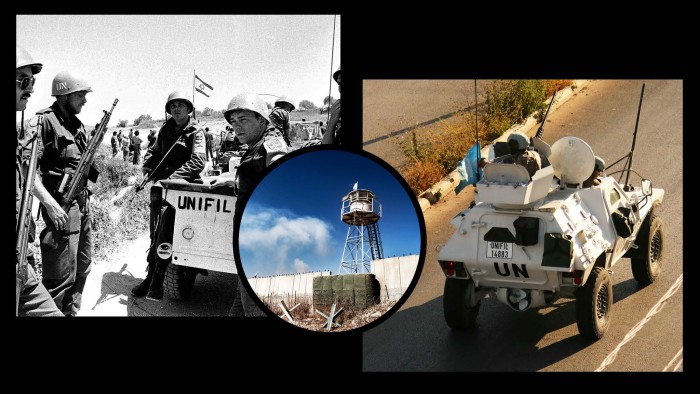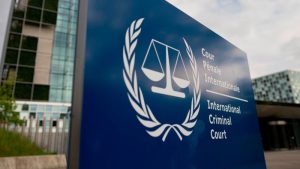The peacekeepers under attack in the Israel-Hizbollah war

Major Hitesh Bathla’s posting for a peacekeeping mission on the volatile Lebanon-Israeli border last year, some 4,000km from his home in India, was always going to be tricky. But now he and his colleagues from Unifil have found themselves in the middle of an invasion.
Missiles, drones and warplanes hurtle overhead, while artillery shrapnel often sprays into Bathla’s base, forcing him and his colleagues into bunkers for up to 48 hours at a time.
“The threat has increased to peacekeepers,” said Bathla, with the practised understatement of a military officer. “We do hear loud noises of the air strikes and shelling. It is happening day and night.”
The major is among the force of 10,000 troops from 48 countries, ranging from Ireland to Indonesia, that has for decades been strung out along the hilly Lebanese terrain that borders Israel in an attempt to keep the peace.
This task has earned Unifil the ire of both Israel and Lebanese militant group Hizbollah. And since Israel launched its recent offensive in Lebanon, they have been under fire. The Israeli army has repeatedly attacked Unifil’s bases, with at least seven peacekeepers injured, and another eight injured by Hizbollah rocket fire. Unifil said on Thursday that “two or three unknown people” fired at a group of peacekeepers while they were on patrol.
Israeli critics, including Prime Minister Benjamin Netanyahu, deride the force as a toothless waste of money.
Yet despite Israel and Hizbollah’s antipathy, politicians and diplomats trying to broker a ceasefire deal say empowering Unifil — and the UN framework under which it operates, Resolution 1701 — is key to ending the decades-old cross-border conflict.
Lebanon’s caretaker prime minister told a visiting Iranian envoy on Friday that Unifil would have a crucial role to play in bringing peace to the country, saying the government’s priority is “a ceasefire, and implementing Resolution 1701 in its entirety”. And even Israel has mooted the idea of a much-expanded mission for the group that would include inspection rights over all Lebanon’s borders, the Financial Times reported last month.

UN peacekeepers were deployed to the region after Israel’s first invasion of Lebanon in 1978, when it was fighting Palestinian militants. Resolution 1701 ended Israel’s most recent war against Hizbollah in Lebanon in 2006, mandating that both sides should withdraw and leave the Lebanese army to control the territory south of the Litani river, which runs about 30km from the Lebanon-Israel border.
UN peacekeepers were supposed to assist the army in monitoring villages and the contested border, to look for anything suspicious like rocket launchers or tunnels.
But 1701 was never implemented. Unifil’s limited mandate, combined with the Lebanese army’s weakness, left them with little chance against a politically ascendant and well-armed Hizbollah able to blend into local communities from which they drew support, said former peacekeepers and military experts.
In practice Unifil’s mission is largely to “observe, record, report”, said Tom Clonan, an Irish commander who led a Unifil unit during the Israeli military’s 1996 Grapes of Wrath operation. “You are literally piggy in the middle.”
Aram Nerguizian, a senior programme adviser at the Carnegie Middle East Centre, said that whenever Unifil attempted “more robust patrolling, it often faced stiff resistance not only from local communities but also by Hizbollah irregulars”. Hizbollah members have killed Unifil soldiers when they are deemed to have ventured into the wrong place, most recently peacekeeper Private Seán Rooney in 2022.
“There’s no Hizbollah marked wagons [or] armoured cars,” said Colin Sheridan, a former peacekeeper in Lebanon and columnist for the Irish Examiner — making the militants harder to identify. Unarmed military observers on patrol “were roughed up, we had our maps, equipment etc taken, and that would have been because we were in some place that they weren’t happy with us”.
The inability of Unifil and the weakened Lebanese army to force Hizbollah away from the border has provoked outrage from Israel, which has accused them of turning a blind eye to the militants’ activities.
But this condemnation misunderstands Unifil’s role, said Rym Momtaz, an editor at Carnegie Endowment for International Peace. Unifil’s mandate is “not to prevent, using weapons, Israeli invasions and occupations of Lebanon”, said Momtaz, nor is it “to use weapons and force to disarm Hizbollah or force them to withdraw north of the Litani river”.

Israel and Hizbollah have been trading fire since the militant group started launching missiles following Hamas’s October 7 attack, displacing some 60,000 Israelis. Vowing to return residents to their homes, Netanyahu last month launched Israel’s fourth invasion of Lebanon which — combined with a devastating Israeli bombing campaign — has displaced more than 1mn people.
The Israeli army has repeatedly attacked Unifil bases in the process. In one incident last month, 15 peacekeepers were injured by suspected white phosphorus smoke. Netanyahu has demanded the international soldiers abandon their posts, and accused Hizbollah of using them as human shields.
While Unifil has condemned the Israeli attacks, it also rebuked Hizbollah after a rocket smashed into the force’s headquarters and caused “minor injuries” to some peacekeepers.
At the same time, UN peacekeeping chief Jean-Pierre Lacroix said this week that Unifil would work with different authorities to support a future settlement and was talking to contributing nations about its future needs.
In the meantime, Bathla and his comrades, whose outpost has not been directly attacked, have become all too familiar with their base’s dim and stuffy bomb shelter, which lacks washroom, kitchen or proper space to sleep. “It’s a little crampy,” demurred Bathla, careful not to complain.
Getting out to monitor has become perilous. Last month Unifil said that Israeli forces shot at peacekeepers after observing them clearing houses in a south Lebanese village.
But Bathla and the former peacekeepers say the war makes another mission, protecting civilians, more important than ever. Some have built bonds with local communities despite the tumultuous relationship. Clonan, the former peacekeeper who is now an Irish senator, recalled Lebanese villagers adopting thick Irish accents and traders naming their stalls “Dunnes” after a popular Irish department store.
In October, it fell to Ghanaian peacekeepers to extract the last two residents of Qawzah village: a pair of elderly sisters, who had tried to stay despite the danger.
“The security situation is challenging. It is putting a lot of restrictions on us to move out. But still, in whatever way is possible, we are trying to help out the locals,” Bathla said.
Recently, he said, there were some people “injured during the shelling or in the air strikes who approached us for medical assistance”, adding: “We were able to help them.”
Cartography by Steven Bernard and Bob Haslett
#peacekeepers #attack #IsraelHizbollah #war






